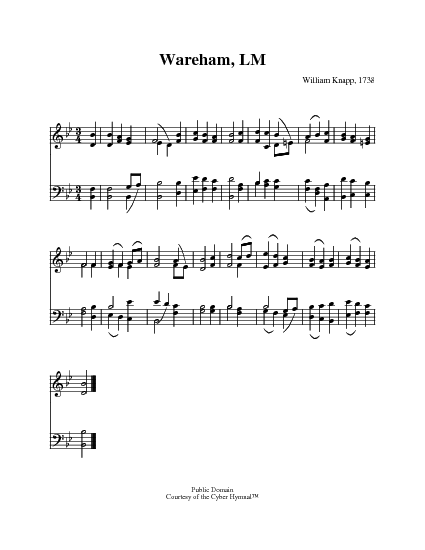- |
User Links
Christ our High Priest and King, and Christ coming to judgment

Now to the Lord, that makes us know
Author: Isaac WattsPublished in 158 hymnals
Printable scores: PDF, MusicXMLAudio files: MIDI
Representative Text
1 Now to the Lord, who makes us know
The wonders of his dying love,
Be humble honors paid below,
And strains of nobler praise above.
2 'Twas he who cleansed our foulest sins,
And washed us in his precious blood;
'Tis he who makes us priest and kings,
And brings us rebels near to God.
3 To Jesus, our atoning Priest,
To Jesus, our eternal King,
Be everlasting power confessed!
Let every tongue his glory sing.
4 Behold! on flying clouds he comes,
And every eye shall see him move;
Though with our sins we pierced him once,
He now displays his pardoning love.
5 The unbelieving world shall wail,
While we rejoice to see the day;
Come, Lord! nor let thy promise fail,
Nor let thy chariot long delay.
Source: Laudes Domini: a selection of spiritual songs, ancient and modern for use in the prayer-meeting #171
Author: Isaac Watts
 Isaac Watts was the son of a schoolmaster, and was born in Southampton, July 17, 1674. He is said to have shown remarkable precocity in childhood, beginning the study of Latin, in his fourth year, and writing respectable verses at the age of seven. At the age of sixteen, he went to London to study in the Academy of the Rev. Thomas Rowe, an Independent minister. In 1698, he became assistant minister of the Independent Church, Berry St., London. In 1702, he became pastor. In 1712, he accepted an invitation to visit Sir Thomas Abney, at his residence of Abney Park, and at Sir Thomas' pressing request, made it his home for the remainder of his life. It was a residence most favourable for his health, and for the prosecution of his literary… Go to person page >
Isaac Watts was the son of a schoolmaster, and was born in Southampton, July 17, 1674. He is said to have shown remarkable precocity in childhood, beginning the study of Latin, in his fourth year, and writing respectable verses at the age of seven. At the age of sixteen, he went to London to study in the Academy of the Rev. Thomas Rowe, an Independent minister. In 1698, he became assistant minister of the Independent Church, Berry St., London. In 1702, he became pastor. In 1712, he accepted an invitation to visit Sir Thomas Abney, at his residence of Abney Park, and at Sir Thomas' pressing request, made it his home for the remainder of his life. It was a residence most favourable for his health, and for the prosecution of his literary… Go to person page >Text Information
| First Line: | Now to the Lord, that makes us know |
| Title: | Christ our High Priest and King, and Christ coming to judgment |
| Author: | Isaac Watts |
| Meter: | 8.8.8.8 |
| Language: | English |
| Copyright: | Public Domain |
Notes
Now to the Lord that makes us know. I. Watts. [Advent—Praise.] First published in his Hymns, &c, 1st edition, 1707, in 5 stanzas of 4 lines, and entitled "Christ our High Priest and King: and Christ coming to Judgment." Its use outside the Nonconformist bodies has been limited. Original text in modern editions of Watts. It has been said that John Mason's Song of Praise, No. 33, on Rev. i., 1-12, suggested this hymn to Watts. The resemblance, however, is confined to the subject alone. In the Scottish Draft Translations and Paraphrases of 1745, No. xlv. is thus composed:—stanzas i.—iii., based on the above, by Watts, and stanza iv. original, the opening line being, “To Him that lov'd the Souls of Men." In the Drafts of 1751 and 1781 it was repeated without alteration, and was finally authorized as No. lxiv. in the Translations and Paraphrases of 1781, again without change. It thus holds the unique position of being the only paraphrase of the Draftof 1745 which passed without alteration into the authorized work of 1781. It has been in use in the Church of Scotland for more than 100 years, and is also included in a limited number of modern hymnals both in Great Britain and America. Its authorship, as distinct from Watts, is unknown. The statement that it is due to J. Morison has been made in ignorance of the fact that it was in print in its present form some four years before his birth.
--John Julian, Dictionary of Hymnology (1907)
Tune
DUKE STREETFirst published anonymously in Henry Boyd's Select Collection of Psalm and Hymn Tunes (1793), DUKE STREET was credited to John Hatton (b. Warrington, England, c. 1710; d, St. Helen's, Lancaster, England, 1793) in William Dixon's Euphonia (1805). Virtually nothing is known about Hatton, its composer,…
WAREHAM (Knapp)
William Knapp (b. Wareham, Dorsetshire, England, 1698; d. Poole, Dorsetshire, 1768) composed WAREHAM, so named for his birthplace. A glover by trade, Knapp served as the parish clerk at St. James's Church in Poole (1729-1768) and was organist in both Wareham and Poole. Known in his time as the "coun…
MENDON (17151)


 My Starred Hymns
My Starred Hymns







